Post-COVID-19 Recovery and Resilience

IMF SEMINAR EVENT
DATE: October 13, 2020
DAY: Tuesday
1:00 PM - 2:00 PM
LOCATION: Virtual
Overview
The COVID-19 crisis provides an opportunity to build forward better. As the world works to defeat the pandemic, countries should aim at transforming their economies to be fairer, smarter and greener. Join this discussion on how to come back stronger.
Join the conversation via #BuildForwardBetter
Post-COVID-19 Recovery and Resilience
The panel discussed how the pandemic provides an opportunity to rebuild a fairer, smarter and greener future; address challenges of climate change, inequality, and gender gaps; build resilience; and support digital transformation. The discussants highlighted that the pandemic has accelerated the macro transformation and there is broader social consensus in favor of sustainability.
Key Points:
- Green Transformation. There is a wide-spread societal support for sustainability calls for accelerating the transition to a greener economy. Carney emphasized that there is a broad-based movement toward greater sustainability through credible, consistent, and impactful climate policies that can help the private sector accelerate the green transition. Fink highlighted that the performance of countries and companies will increasingly reflect the extent they address climate risks.
- Digitalization and Gender Gaps. The pandemic presents an opportunity to deal with the digital divide by leveraging digitalization for development and tackling gender gap. Georgieva stressed the need to build digital infrastructure and pointed to cases where digitalization hubs had helped tackle persistent challenges in developing countries. Fink recommended scaling digital infrastructure by providing digital access to households globally, positively impacting quality of life through enhanced access to education and health care. Carney underlined the positive role of digitalization and fintech in the growth of small and medium-size businesses.
- Policy Recommendations: As countries move toward mitigating the impact of the pandemic, there is a need to combine recovery measures and long-term strategies. Georgieva highlighted the positive impact of green policies and digitalization on creating jobs and reducing inequalities. Sousa outlined the challenges in managing a reform agenda during the health crisis while supporting sustainable growth. Initiatives such as the G20 DSSI should be combined with efforts to attract investment and diversify the economy. Georgieva advised governments to avoid early withdrawal of support and to target stimulus toward economic transformation.
Quotes:
“We can create green jobs and our recent research shows that direct stimulus to green infrastructure it will have a fantastic impact on jobs. If we want to give opportunities to people, we need to go digital everywhere." Kristalina Georgieva
“We need to make sure that nobody is left behind.” Vera Daves de Sousa
“It is urgent as we refocus our societies to raise the bar to create infrastructure [so] that every household in the world has the ability to have digitalization at home.” Laurence Fink
"...when you have 105 countries now explicitly committed to net-zero targets, the market gets on supplying that." Mark Carney
Panelists
Panelist: Kristalina Georgieva
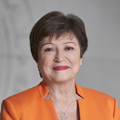 Kristalina Georgieva is the Managing Director of the International Monetary Fund (IMF). She is the first person from an emerging market economy to lead the IMF since its inception in 1944. Before joining the Fund, Ms. Georgieva was Chief Executive Officer of the World Bank and also served as Interim President for a time. Previously, she served at the European Commission as Vice President for Budget and Human Resources – and as Commissioner for International Cooperation, Humanitarian Aid and Crisis Response. She was named “European of the Year” and “Commissioner of the Year” by European Voice for her leadership in the European Union’s humanitarian response to crises.
Kristalina Georgieva is the Managing Director of the International Monetary Fund (IMF). She is the first person from an emerging market economy to lead the IMF since its inception in 1944. Before joining the Fund, Ms. Georgieva was Chief Executive Officer of the World Bank and also served as Interim President for a time. Previously, she served at the European Commission as Vice President for Budget and Human Resources – and as Commissioner for International Cooperation, Humanitarian Aid and Crisis Response. She was named “European of the Year” and “Commissioner of the Year” by European Voice for her leadership in the European Union’s humanitarian response to crises.
Panelist: Mark Carney
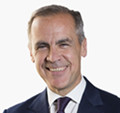
Mark Carney is currently the UN Special Envoy for Climate Action and Finance and Prime Minister Johnson’s Finance Adviser for COP26.
Mark was previously Governor of the Bank of England (from 2013 to 2020), and Governor of the Bank of Canada (from 2008 to 2013).
Internationally, Mark was Chair of the Financial Stability Board (from 2011 to 2018), He chaired the Global Economy Meeting and Economic Consultative Committee of the Bank for International Settlements (from 2018-2020) and was First Vice-Chair of the European Systemic Risk Board (from 2013-2020). He is Vice Chair of Brookfield Asset Management and a member of the Global Advisory Board of PIMCO, the Group of Thirty, the Foundation Board of the World Economic Forum, as well as the boards of Bloomberg Philanthropies, the Peterson Institute for International Economics and the Hoffman Institute for Global Business and Society at INSEAD.
Panelist: Vera Daves de Sousa
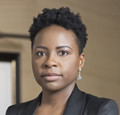
Vera Esperança dos Santos Daves de Sousa, was born in Luanda and has a degree in Economics from the Catholic University of Angola (UCAN). She is the first woman to rise to the post of Minister of Finance in Angola.Until the date of her appointment she was Secretary of State for Finance and Treasury. Her curriculum includes the Course on Banking Techniques and Practices by the Institute for Banking Training in Portugal, and Derivatives and Bond Markets Course (ICAP). She has worked as finance technician at Sonangol ESSA, Director of the Products and Research Office in Banco Privado Atlântico, teacher of Financial Markets at the Executive MBA promoted by the Catholic Business School Alliance, teacher of Public Finance and Economic Integration at UCAN - Faculty of Economics. From 2014 to 2016 she worked as Executive Director of the Capital Market Commission and from september, 2016 to October, 2017 she worked as Chairman of the Capital Market Commission. Vera Daves de Sousa also played the role of Economic commentator in various media. She was the co-author of a book on Public Finance. Her hobbies are dance, yoga and reading.
Panelist: Laurence Fink
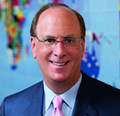
Laurence D. Fink is Founder, Chairman and Chief Executive Officer of BlackRock, Inc. He and seven partners founded BlackRock in 1988, and under his leadership, the firm has grown into a global leader in investment and technology solutions to help investors build better financial futures. Today, BlackRock is trusted to manage more money than any other investment firm in the world. Mr. Fink has been named one of the "World's Greatest Leaders" by Fortune, and Barron’s has named him one of the "World's Best CEOs" for 14 consecutive years.
Prior to founding BlackRock in 1988, Mr. Fink was a member of the Management Committee and a Managing Director of The First Boston Corporation.
He serves as a member of the Board of Trustees of New York University (NYU) and the World Economic Forum, and is Co-Chairman of the NYU Langone Medical Center Board of Trustees. In addition, he serves on the boards of the Museum of Modern Art and the Council on Foreign Relations. He also serves on the Advisory Board of the Tsinghua University School of Economics and Management in Beijing and on the Executive Committee of the Partnership for New York City.
Mr. Fink earned an MBA with a concentration in real estate from the University of California at Los Angeles (UCLA) in 1976 and a BA in political science from UCLA in 1974.
Moderator: Francine Lacqua
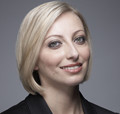
Francine Lacqua, award-winning, London anchor at Bloomberg Television’s “The Pulse,” provides business and finance updates and hosts “Bloomberg Surveillance” with Tom Keene, reviewing global markets and business stories.
She also presents "Leaders with Lacqua," and Eye to Eye” interviewing CEOs, entrepreneurs and public figures.
Since joining Bloomberg in 2000, she has reported on the World Economic Forum, IMF/World Bank, G20, EU Leaders Summit and OPEC, and interviewed global figures including UK Prime Minister David Cameron, IMF Managing Director Christine Lagarde, World Bank President Jim Kim and George Soros.







